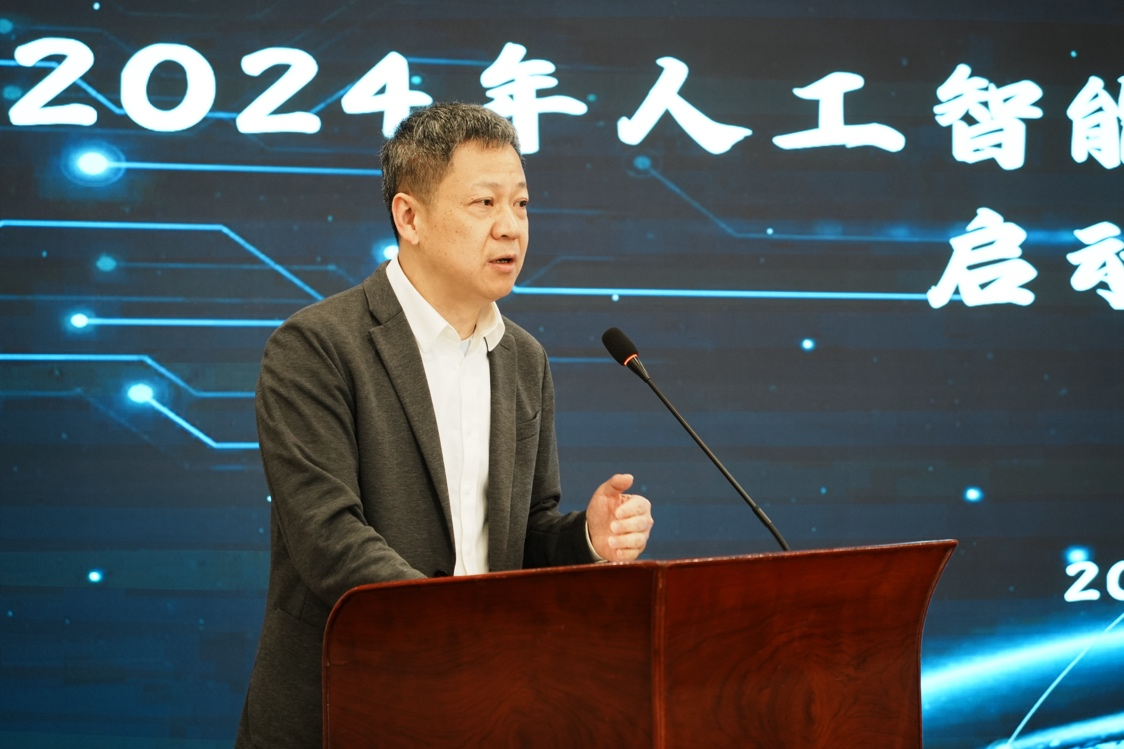 To implement the Outline of Building a Leading Country in Education, further the strategy of digital education, enhance excellence creation, and improve the quality of English teaching, while also broadening the scope of educational reform courses and student involvement, the School of Foreign Languages at the Open University of China (OUC) hosts 2024 Seminar for the Launch of AI-Empowered Smart English Teaching Reform from 27 to 28 March.
To implement the Outline of Building a Leading Country in Education, further the strategy of digital education, enhance excellence creation, and improve the quality of English teaching, while also broadening the scope of educational reform courses and student involvement, the School of Foreign Languages at the Open University of China (OUC) hosts 2024 Seminar for the Launch of AI-Empowered Smart English Teaching Reform from 27 to 28 March.
This initiative aims to refine the process of teaching reform and solidify the practical effects of these reforms.

Ying Yue, vice president and a member of the Party Committee of Zhejiang Open University (OU), delivered a speech summarizing the teaching reform and development efforts at Zhejiang OU in recent years. He highlighted that the university has concentrated on advancing AI-powered smart English teaching reforms, maintaining a student-centered and demand-oriented approach. As a result, not only has the quality of teaching been consolidated and enhanced, but students' foundational and application skills have also seen significant improvement. This approach has effectively raised the standard of public English education and teaching methodologies. Additionally, a range of practical and accessible learning resources has been developed, earning widespread recognition from the public. Moving forward, Zhejiang OU plans to further deepen teaching reforms driven by technological innovation, aiming to boost the overall quality and efficiency of education and teaching, and to cultivate high-quality talent for society.
Zheng Jipeng, vice dean of the OUC School of Foreign Languages, reviewed and discussed the future of AI-powered smart English teaching reforms within the faculty. He noted that, while significant achievements have been made in smart teaching reforms over the past period, there are numerous areas for optimization and expansion. Zheng analysed the current state of vocational education initiatives, trends in higher education, and developments in open education both domestically and internationally. He also shared his insights on the digitalisation of education and the reforms needed for smart English teaching. For the 2024 smart teaching reforms, he proposed a comprehensive strategy and educational reform objectives across several key areas: enhancing organisational leadership, improving institutional structure, implementing educational reform measures, solidifying teaching outcomes, refining distinctive features, organising student competitions, summarizing teaching accomplishments, and fostering research findings.

To better understand the development direction of foreign languages in vocational education, clarify the focus of educational reform efforts, and summarize the achievements of teaching reforms, Professor Chang Hongmei, the executive director and secretary-general of the Teaching Steering Committee for Foreign Languages in Vocational Colleges of the Ministry of Education (MOE), and vice president of Beijing Union University, along with Professor Liu Dailin, a former leading member of the Teaching Steering Committee for Foreign Languages in Vocational Colleges of the MOE, were invited to the seminar. Chang Hongmei provided a comprehensive overview of the development and evolution of standards for foreign language teaching in vocational education, the direction of foreign language teaching, and talent development models in the Age of Digital Intelligence. She also shared insights into the experience of applying for teaching achievement awards within the reform system. Liu Dailin led a thematic discussion with English teachers attending the event, focusing on the open cause and teacher development. She explored the evolution of English teaching at the Open University, highlighting the critical roles of communication, innovation, and cooperation in education. She noted that the advent of new technologies, such as MOOCs, has greatly enhanced the prospects for open education, allowing it to showcase and lead in teaching methodologies. The push towards AI-powered smart English teaching reform represents a new challenge for open education teachers in the digital era. The insights shared by these experts not only reveal a forward-thinking approach and practical wisdom in the realm of foreign language education but also offer valuable experiences and inspiration for the teachers participating in the event.
To further enhance teachers' digital literacy in educational reform, their skills in collecting, analyzing, and interpreting data, as well as in precisely understanding the teaching reform process and concisely summarizing its achievements, several scholars and technical experts were invited to this seminar. Their aim was to share practical techniques and case studies on how data analysis can improve teaching effectiveness and research capabilities. This initiative sought to help teachers develop data-driven thinking and more effectively use data analysis tools, thereby improving the quality of education and research efficiency. The experts introduced data analysis methods across various areas, including oral training, the use of intelligent learning companions, adaptive learning, essay grading, and the design and methods of quantitative research on English writing texts. The atmosphere at the event was vibrant, characterized by eager participation and interaction.

The teachers responsible for the pilot programme of smart teaching reform also engaged in exchange activities, where they discussed feedback on the implementation of adaptive learning systems, shared experiences, identified challenges, and proposed suggestions for teaching reform. This event represents a significant advancement for the OUC Faculty of Foreign Languages in smart teaching reform, offering valuable insights and navigating the way for future educational reform.
By Li Sihan, OUC